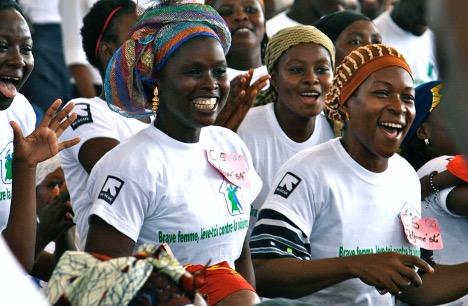In This Story
George Mason and the International Rescue Committee (IRC) awarded grant to help foster social empowerment and gender equity among forcibly displaced populations (FDPs).
Jhumka Gupta, ScD, MPH, associate professor from George Mason University Department of Global and Community Health and Jessica Dalpe, LMSW, from the International Rescue Committee (IRC) have been awarded a Robert Wood Johnson Foundation Evidence for Action grant to help foster social empowerment and gender equity among forcibly displaced populations (FDPs). The IRC -developed Economic and Social Empowerment (EA$E) intervention has shown promise in reducing intimate partner violence and improving gender equity in Cote d’Ivoire. The program aims to reduce intimate partner violence among FDPs by looking at women’s sources of income and job opportunities as well as men’s perceptions of women’s value to the household (See Figure 1). Gupta and fellow principal investigator, Dalpe, will study whether the EA$E intervention can be adapted to FDPs in the United States. The investigators seek to identify programmatic components that are perceived as acceptable/not acceptable and to better understand and address potential barriers to implementing the intervention. Findings will lead to the formulation of data-informed recommendations for adapting EA$E for US-based FDPs.
“We look forward to further studying the relationship between economic and social empowerment and intimate partner violence – and how we can promote gender equity in US-based families who have been forcibly replaced. This project builds on my prior intervention research on the EA$E intervention with the IRC, and I am excited about adapting innovative gender equity interventions from abroad to the US context,” said Gupta.
“From listening to women and communities through IRC’s responses to conflict and crises we know that women face unique challenges in achieving gender equity within societies and within their homes. Women are less likely than men to have power in household decision-making while they continue to bear the weight of unpaid and unacknowledged caregiving in society. Through this partnership and support from Robert Wood Johnson Foundations’ Evidence for Action Approaches to Gender Equity Around the Globe, the IRC will work with George Mason University to assess the viability of existing equity frameworks for women, and identify new interventions to ensure gender equity for women in displaced communities,” said Dalpe.
Disclaimer: Support for this work was provided by the Robert Wood Johnson Foundation. The views expressed here do not necessarily reflect the views of the Foundation.


